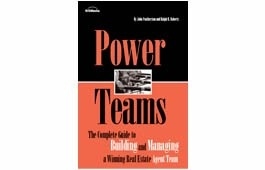
Excerpt series provides insight into recently released book
RISMEDIA, May 26, 2008-You probably started your career doing everything yourself-answering the phones, meeting with clients, assembling marketing packets, putting together sales presentations, and even putting up For Sales signs. By doing everything yourself, you didn’t have to waste time telling someone else how to do it, and you were always certain that everything was done to perfection. When you start a team, your role and responsibilities change. As team leader, you need to coordinate, delegate, and focus more energy on generating business rather than taking care of business.
In Chapter 3 of RISMedia’s recently released book, Power Teams: The Complete Guide to Building and Managing a Winning Real Estate Agent Team, by RISMedia President & CEO John Featherston and top-producing Broker Ralph R. Roberts, we provide guidance that can help you ease the transition from independent agent to team leader. Following is an excerpt from Chapter 3:
Recognizing your target: What a remarkable team leader does
Becoming a top-notch manager-someone your team members respect and love but someone who also runs a profitable business-is a lifelong process. Before you can get to that place, though, you need to recognize the major responsibilities of an accomplished team leader. As team leader, your team depends on you to do the following:
Create and communicate a clear vision. Formulate a clear vision for your team and then make sure everyone knows what that vision is and the role that each individual needs to play.
Plan the work, and then work the plan. You need to put the systems in place to accomplish every task that needs to be done-from marketing your business and homes you’ve listed, to processing transactions and expanding your business.
Create an enjoyable workplace. Enjoy the people you work with and the activities that you’re involved in on a daily basis. Feel free to break the routine every once in awhile. You don’t need to turn each day into a wild party (nor should you, if you ever want to be successful), but don’t lose your soul in pursuit of success. Crack a smile. Crack a joke. Celebrate accomplishments.
Be a positive role model. All other team members follow your lead, so model the behavior you expect from them. If you’re ripping people off, coming in late to work and leaving early, or complaining all the time, your teammates will view that behavior as appropriate and acceptable.
Commit yourself to the success of your teammates. Hire great people and give them everything they need to be successful-resources, technology, training, coaching, and so on. Invest heavily in their success, especially early on, and then give them the freedom and responsibility to take it to the next level.
Consistently hold and manage productive meetings with team members. According to almost everyone we talked to during the writing of this book, team meetings and individual meetings were key tools in enabling team leaders to build and manage a successful agent team.
Delegate and let go. Don’t hover over team members to make sure they get their work done. Hire people you can trust to do the job you’re hiring them for, provide them with the training and tools they need, and then let them perform.
Create a system of accountability. Make each team member accountable for his or her own success or failure, so you don’t have to step in and take disciplinary measures.
Communicate clearly. As an agent and team leader, communication is essential, and we don’t mean simply expressing yourself clearly; we also mean listening to what your teammates have to say.
Deal with issues immediately. Don’t let problems fester. If your team has some internal strife, investigate the problem, identify the root cause, and then address the problem with everyone involved.
Manage your team’s growth. Make sure your team has the infrastructure in place to support new team members before you add a new member to the team.










